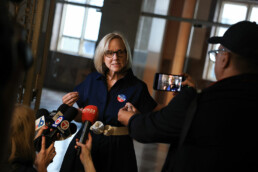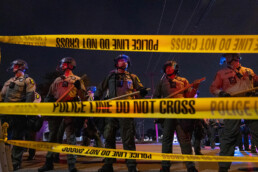Doctors and Nurses vs. ICE
 January 27, 2026 Hey there, Meteor readers, The ice outside my door is so thick, I could probably skate on it if I really tried. But considering everything going on in the world, that’s not the worst thing to see in the morning.  WNBA STAR AND UNRIVALED CO-FOUNDER BREANNA STEWART. (SCREENSHOT VIA INSTAGRAM). In today’s newsletter, Dr. Heather Irobunda helps us understand what healthcare providers are feeling right now. Plus, the next general strike is coming. Throwing salt, Shannon Melero  WHAT'S GOING ONFighting for our health: “There’s this thought that our scrubs—our professions—would protect us,” says Dr. Heather Irobunda, a New York-based OB/GYN and reproductive rights advocate. To see Alex Pretti “shot like that was very jarring for our field.” Pretti, an ICU nurse at a Veterans Affairs hospital in Minneapolis who was murdered by federal agents on Saturday, has sparked action across the country. His killing—much like the killings of Renee Good, Keith Porter, and Silverio Villegas Gonzelez—has reminded us that everyone is unsafe as long as ICE and CBP agents are allowed to operate unchecked. While activists have long been raising the alarms about ICE’s unmitigated cruelty, Pretti’s status as a nurse has added a new dimension to the conversation. The medical field has come out strongly against Alex Pretti’s killing, emphasizing nurses’ roles as guardians of the vulnerable. (The Washington State Nurses Association pointed out a germane directive in The Code of Ethics for Nurses: “Where there are human rights violations, nurses ought to and must stand up for those rights and demand accountability.”) It’s hard to continue defending agents once they’ve murdered a caretaker who, in his last act on earth, was trying to shield someone from pepper spray. Is that not the kind of person—the kind of man—we ask our children to work toward becoming?  PROTESTORS IN MINNEAPOLIS THIS WEEK (VIA GETTY IMAGES) For those in the medical field, ICE’s increased presence isn’t just a question of morality or policy; it’s a threat to public health. On one level, Dr. Irobunda says, the connection is extremely straightforward. “One of the biggest markers of health is mortality,” she says. “They are killing people in the streets.” And there’s a ripple effect. Dr. Irobunda shares that one of her patients, a pregnant woman with gestational diabetes, lost her husband to deportation. He was the primary breadwinner, and when he was arrested, she couldn’t afford food and was eating only rice and plantain for days at a time. More than likely, her child will have diabetes at birth. Patients are also skipping appointments—including, as reporting from The 19th highlights, crucial prenatal care—for fear of being arrested on their way to the doctor or hospital. In Dr. Irobunda’s neighborhood hospital in Queens, ICE agents “routinely hang out down the street,” she says. ICE isn’t just looking to arrest patients, but also doctors and nurses with visas or permanent residence, who are “scared to come to work, too.” She explains that due to a shortage of healthcare workers in the U.S., doctors have been traveling from other countries to treat patients. But issues with visa delays and concerns over ICE have made getting doctors into hospitals that much harder. Despite the dangers, the medical community has been incredibly vocal about the health implications of ICE’s scare tactics. Just last month, healthcare workers staged a protest outside an ICE facility in Portland, Oregon. Doctors have also accused ICE of medical neglect for people in detention—a plausible accusation considering that in both the Good and Pretti killings, ICE blocked medical personnel from the scene.  PROTESTORS IN OREGON "EXERCISING" THEIR FIRST AMENDMENT RIGHTS OUTSIDE OF AN ICE FACILITY. (VIA GETTY IMAGES) “A lot of us were taught that this is an apolitical job,” Dr. Irobunda says. “In an ideal society where everybody's treated equally and getting what they need, we wouldn't have to be political.” But in a system where policy can have the power to change health outcomes for millions, Dr. Irobunda says, “we have to be involved. No one’s safe unless we’re all safe.” AND:
 THE SMILE OF A WINNER ON AND OFF THE FIELD (VIA GETTY IMAGES)
 FOLLOW THE METEOR Thank you for reading The Meteor! Got this from a friend?
|
![]()
The nurses will not back down
US News
 January 15, 2026 Hi there, Meteor readers, The 2016 nostalgia dominating my social feeds has me in my feelings today. I’m thinking about all the protests that year, now overshadowed by the acute tragedy of Donald Trump’s victory that fall. In America, there were the Black Lives Matter marches condemning the murders of Alton Sterling and Philando Castile, and the students who took to the streets after Stanford rapist Brock Turner’s lighter-than-air sentencing. Overseas, there were the Black Monday strikes in Poland against proposed abortion bans, anti-corruption demonstrations in Brazil, and millions-deep marches following Brexit. Maybe it’s because I was younger, or because I’d been lulled by the dulcet tones of Obama’s rhetoric, but my sense of indignation was fresher back then. Hotter. More vivid. This week, as the powers that be attempt to quash dissent both here and abroad, I’m channeling that energy anew.  Today, Meteor contributor Ann Vettikkal brings us a dispatch from the historic nurse’s strike in New York City. Plus, a tribute to an unsung civil rights hero, and your weekend reading. 2016 on the scene, Nona Willis Aronowitz  WHAT’S GOING ON“We’re here for our safety”: “What do we want? A fair contract! When do we want it? Now!” This past Tuesday morning, a sea of demonstrators in red surrounded Columbia University Irving Medical Center demanding a fair contract prioritizing patient and nurse safety. They chanted and struck cowbells; one sign read, “Staffing so unsafe, Florence Nightingale is rolling in her grave.” Shows of solidarity in the form of honks, cheers, and salsa music echoed throughout Washington Heights.  NURSES INVOKING THE GOAT, FLORENCE NIGHTINGALE. CREDIT: GETTY IMAGESThe largest nurses’ strike in New York City’s history has now entered its fourth day. On Monday morning, nearly 15,000 nurses walked out of the Montefiore Medical Center and multiple hospitals in the New York-Presbyterian and Mount Sinai Health System network. The nurse’s union, New York State Nurses Association, says management refuses to budge on key issues. (“Here’s a pebble, here’s a little grain of salt” is how one nurse characterized management’s response.) The union says the strike is focused on protecting nurses’ healthcare benefits, safeguards against workplace violence, and safe staffing mandates, which ensures enough nurses are scheduled each day to deliver safe, quality patient care. Joe Solmonese, a spokesperson for Montefiore Medical Center, called their requests “reckless”; a statement from Mount Sinai said NYSNA refused to “move on from its extreme economic demands” for significant pay raises. “The hospitals take advantage [of the fact] that we are the ones that actually care about our patients,” said Beth Loudin, a pediatric nurse and president of the bargaining unit at New York-Presbyterian, who was picketing on Tuesday. “They don’t think we would go outside and fight for the things that actually protect us and protect our patients.”  BETH LOUDIN AT THE PICKET LINE. CREDIT: ANN VETTIKKALLoudin became a nurse a decade ago because of her passion for listening and advocating for people in difficult times. She joined the union four years ago and eventually rose to leadership. She pointed to the gains a smaller nurses’ strike involving Mount Sinai and Montefiore won three years ago—which included hiring additional nurses, and implementing minimum nurse-to-patient ratios—as a precedent for this “historic” strike. There are plans to head back to the negotiation table this evening, according to a NYSNA statement released this morning. In addition to their original demands, NYSNA charges that Mount Sinai “unlawfully terminated” and disciplined several outspoken nurses in the days leading up to the strike. Several politicians have shown their support, including Mayor Zohran Mamdani, who joined the picket and donned a red NYSNA scarf on the first day of the strike. “These nurses are here for New Yorkers,” Mamdani said in a statement to the press. “They show up and all they are asking for in return is dignity, respect, and the fair pay and treatment that they deserve.” This strike comes on the heels of many other nurses’ strikes across the country. Given that nursing is the number one occupation for women, these fights could meaningfully move the needle on the overall quality of life for women in this country. “It’s now a wave,” Loudin said. “We’re here for the patients. We’re here for our safety. I hope that wave just continues to grow and grow and grow.” —Ann Vettikkal AND:
 CLAUDETTE COLVIN IN 1998. CREDIT: GETTY IMAGES
 WEEKEND READING AND LISTENING 📚 🔊On systemic racism: Why this Texas county is the deadliest place for Black mothers to have a baby. (Capital B) On frenemies: Dayna Tortorici untangles the many divisions that have torn feminists apart for 200 years. (n +1) On “the last American dream”: Please enjoy this exceedingly delightful interview with comedian Robby Hoffman on masculinity, her Hasidic upbringing, and rich-people guilt. (Talk Easy with Sam Fragoso)
|
![]()
Renee Nicole, and Keith, and Marimar, and...
 January 9, 2026 Hey there, Meteor readers, Anyone else already getting impatient waiting for Heated Rivalry, Season Two? We NEED to get back to the cottage.  In today’s newsletter, we look at the story that’s on all our minds today—the murder of Renee Nicole Good—and the long road of violence that preceded it. Plus, a moment of good news for parents, and your weekend reading list. One day at a time, The Meteor Team  WHAT'S GOING ONA growing list of names: Yesterday, a masked ICE agent in Minneapolis shot and killed Renee Nicole Good, who had allegedly been blocking agents from entering her neighborhood. Shortly after the shooting, a Department of Homeland Security spokesperson referred to Good as a “violent rioter” and called the killing an act of self-defense. DHS Secretary Kristi Noem even suggested that Good was part of a group carrying out a “domestic act of terrorism” using vehicles as weapons. But video from the scene shows Good giving way to federal vehicles and trying to respond to conflicting orders from DHS agents, shortly before she was approached and shot through her windshield. Witnesses to the murder have also contradicted DHS’s account of what happened, and video also appears to show ICE preventing medical personnel from nearing the scene. Good’s murder has sparked protests in Minneapolis and calls for investigations into ICE’s tactics. Renee Nicole Good was a parent. Just like Keith Porter, who was shot and killed by an off-duty ICE officer in December for reportedly not complying with an order. Renee Nicole Good had a life, a family, a job. Just like Silverio Villegas Gonzalez, who was shot and killed by ICE agents during a traffic stop in September. Renee Nicole Good was sitting in her car, just like Marimar Martinez, a teaching assistant in Chicago who was shot five times by ICE agents in October. (Miraculously, Martinez survived.) Renee Nicole Good’s community was being terrorized by a violent group of thugs hiding behind masks and the emblem of a federal agency—just like communities in Boyle Heights, Westlake, Santa Ana, Pasadena, and Chicago. And that’s not even to speak of what happens where videos rarely record: In 2025, 32 people died while in ICE custody—the most in more than two decades. Movements in America often gain traction after a horrific event spurs people into action. The violence has to be so profound, so unbearable, or so vividly recorded to shake us from a passive state. But those boiling points are never the first incidents. Patrisse Cullors, Alicia Garza, and Opal Tometi launched Black Lives Matter back in 2013, after the man who killed Trayvon Martin was acquitted—seven years before the murder of George Floyd sparked massive protests across the country. Tarana Burke amplified stories of sexual assault and harassment for more than a decade before reporters exposed Harvey Weinstein’s crimes and MeToo went viral. The question I find myself asking is: Will Renee Nicole Good be the one? Will her murder be the turning point for us to stay in the streets, for judges to intervene, for any lawmaker still waffling to decide “no more”? Or will she blend in with the rest of the violence? A month from now, will we forget her name as we’ve forgotten Keith, Silverio, Marimar, and the dozens of others who never had their moment in the national news spotlight? How much does the body count have to rise for every last person to flood the streets for justice? Because it must be all of us. Our elected leaders are not equipped to take on this task alone. Rep. Ayanna Pressley made her stand and demanded an investigation into the killing of Renee Nicole Good; the GOP blocked it. Former Chicago Mayor Lori Lightfoot is launching an ICE Accountability Project, which is a step in the right direction, and Rep. Robin Kelly is filing articles of impeachment against DHS Secretary Kristi Noem. But between 2015 and 2021, ICE agents were involved in 23 fatal shootings. No agents were indicted. Will this be the year we stop at one? AND:
 A POSTCARD FROM MAMDANISTAN 😘 (VIA GETTY IMAGES)
 WEEKEND READING 📚On history: On the heels of a protester’s violent death at the hands of law enforcement, it might be useful to reread Jill Lepore’s 2020 piece on whether we still recall the lessons learned in blood at Kent State. (The New Yorker) On healing: There are glimmers of hope for the uninsured in America. (The Baffler) On heroes: To celebrate Wyoming’s recent abortion win, here’s a profile of Julie Burkhart, an unstoppable abortion care provider in the state. Even an arsonist burning down her clinic wasn’t enough to slow her down. (The Story Exchange)  FOLLOW THE METEOR Thank you for reading The Meteor! Got this from a friend?
|
![]()
A Blue Sky in Miami
 December 11, 2025 Salutations, Meteor readers, I have chosen to join the cult of Scott Hunter. I will not be taking any questions at this time. Please tell my family I’ll miss them.  In today’s newsletter, we unpack a historic mayoral victory in Miami. Plus, a discussion on the never-ending fight to end gun violence with a teacher who survived Sandy Hook. 🏒♥️, Shannon Melero  WHAT'S GOING ONWelcome to (blue) Miami: This week, the city of Miami elected its first woman mayor, and to the shock of all the Brickell girlies—the new mayor is a Democrat. Eileen Higgins, a moderate in a recently Trump-y city, is the first blue mayor Miami has seen since the late ‘90s. Higgins was up against a Trump-backed candidate in the president’s favorite state and still secured nearly 60 percent of the vote. And, much like the election of Zohran Mamdani in New York, this mayoral victory feels like part of a bigger trend. The mayor-elect herself agrees. People are paying close attention to mayoral races because “local government is where real change happens,” Higgins writes The Meteor in an email. It’s “where leaders can cut through dysfunction and improve daily life in measurable ways.” Amanda Litman, cofounder and executive director of Run for Something, sees Higgins’ win as a direct response to federal chaos: “When national politics feels noisy or gridlocked, voters look to the leaders who can get things done, and mayors can,” she says.  YOU CAN'T MESS WITH SOMEONE WITH A BOB THIS SHARP. (VIA GETTY IMAGES) And of course, there’s the idea that these mayoral races are a sign of things to come. Higgins’ election “shows that momentum is on Democrats’ side,” explains A’shanti Gholar, president of Emerge America. “She spoke to [voters] about their basic needs, what they want for themselves and their families,” rather than focusing on the opposition. Higgins has a history of attracting a wide range of voters; she was a commissioner for Republican-leaning Miami-Dade County. “When you focus on delivering results on issues like affordability, transit, public safety, and flooding,” Higgins tells The Meteor, “voters will cross party lines.” The GOP, unsurprisingly, tried to downplay the larger significance of Higgins’ win. “It’s not a rebuke of the president or the party,” Miami-Dade County Chair Kevin Cooper told reporters. “Democratic city elects Democratic mayor.” The numbers tell a different story about that “Democratic city.” According to this year’s voter registration information, of the more than one million people registered to vote in Miami-Dade County, a combined 450,000 are registered with the Conservative Party of Florida and the Republican Party of Florida—significantly more than the 407,000 registered Democrats. But while Miami may be increasingly red (and helped elect Trump last year), it also has a large immigrant population and has been a key target of ICE. Higgins has acknowledged immigrants’ fear, and has spoken out against the administration’s policies, calling them “trickle-down hatred” and “inhumane.” Her victory shows buyer’s remorse may be finally kicking in. “The immigrant communities that voted for Trump [are feeling like] ‘This guy played us,’” Gholar says. (Twice bitten, thrice shy is the saying, right?) For Democrats and anyone interested in running for office, Litman sees a clear lesson: “Nothing in politics is predetermined. The map isn’t fixed. When Democrats invest early, recruit great candidates, and build local infrastructure, we can compete anywhere.” AND:
 Three Questions About...Gun SafetyThirteen years after the Sandy Hook tragedy, survivor Abbey Clements reflects on creating a gun safety organization “for teachers by teachers.”BY ANN VETTIKKAL  CLEMENTS APPEARED AT THE 2024 DNC WITH OTHER SURVIVORS OF SCHOOL SHOOTINGS. (VIA GETTY IMAGES) For more than a decade after elementary school teacher Abbey Clements survived the Sandy Hook mass shooting—during which she protected and distracted her students from the gunshots thundering through the school—she worked overtime. During the weekdays, she continued to teach second grade in Newtown, Connecticut. And in her off hours, she was a fierce advocate in the movement to end gun violence. Clements trained volunteers, planned vigils, and found creative ways to engage people on the issue. “I was waiting for an educator-focused group to emerge,” Clements said, “and it just wasn't happening.” The last straw was November 30, 2021, when a school shooting at Oxford High School in Oxford Township, Michigan, took the lives of four students. Clements remembers expressing frustration in a group chat with Sarah Lerner, a teacher who survived the Marjory Stoneman Douglas mass shooting in Florida, and Sari Beth Rosenberg, an educator and activist in New York City. The three went on to found Teachers Unify, an organization “for teachers by teachers” that aims to involve educators in the demand for national gun safety. We talked to Clements about what she’s doing—and what needs to change. The 13th anniversary of Sandy Hook is this weekend. How has the movement to end gun violence changed since the Sandy Hook tragedy? What's changed the most is that many factions of our society have come together to raise their voice on this issue. You see people coming up from the medical field. You see clergy bonding together, speaking out about this. [You see] organizing by students….What hasn't changed, or what perhaps has gotten worse, is we've identified that guns are the leading cause of death for children in America. So, although we've seen lots of different factions of our society stepping up, we haven't seen [the] legislation, and culture change, that we need. Data clearly shows that states with common sense legislation have fewer gun tragedies, [but we also] know that legislation alone won’t end this public health crisis. An estimated 4.6 million children live in homes with at least one loaded, unlocked firearm, and we also know that about three-fourths of school shooters get their gun from home or from a family member or relative. A culture shift could save so many lives. What work is Teachers Unify focusing on right now? Teachers are among the most trusted voices, according to a 2025 Gallup poll, just under nurses. But in terms of policy and what's best for kids, our voices just haven't been included in the conversation…The second graders who endured the tragedy with me are now college students, and they're watching these shootings happen over and over again, and I refuse to give up on them. Teachers have so much to offer on this issue. We just haven't been intentionally brought into the movement until now. And so the mission of Teachers Unify is to empower educators to demand that communities are safe from gun violence, and that first step is for us to see ourselves as the experts we are. We know what's best for kids. We were trained. [That’s why we need to get] a seat at the table for these vital conversations. That looks like presenting at conferences and panels across the country, and we just launched an unprecedented crisis intervention and support team. [This is a team of] school shooting survivors and clinicians who have lived experience responding to communities after gun violence. [They] can come into school communities, and really work with the staff to help them move forward. What are some things people can do to support these efforts? People can encourage their school leaders, their kids, school officials, administrators, superintendents, town officials to send secure firearm storage information home with kids from school. There are a few states doing this, but this is, unfortunately, not common practice, because this issue is seen as partisan when it is a public health crisis. So parents and allies can help start that conversation through their PTAs. The National PTA is a big supporter of secure firearms storage, and I feel like this is our biggest chance for widespread change, if we could normalize education around this and get the schools to send out periodic reminders, especially during the holidays. This interview has been condensed and edited.  WEEKEND READING 📚On gender roles: Being “manly” won’t get men what they want out of life. (Vox) On being iconic: A’ja. Wilson. (TIME) On sleigh bells: How heteros hijacked the holidays. (Dire Straights Podcast)  FOLLOW THE METEOR Thank you for reading The Meteor! Got this from a friend?
|
![]()
Make America Full Again
 November 25, 2025 Greetings, Meteor readers, To me, this is the best week in America. The air is freighted with anticipation and cheer, and no one has burnt the sweet potatoes or said something offensive yet. The pie crust is in the freezer (the pie crust is in the freezer, right?). And it’s all merriment and good vibes and OOO messages from here on out.  But of course, not everyone gets to savor the start of this festive season. In today’s newsletter, we check in on SNAP—the program that’s meant to feed the nation’s hungriest and which this administration seems determined to weaken. Below that, a few courageous women to give you hope. With butter, Mattie Kahn  WHAT'S GOING ONFood for thought: As we head into a holiday so heavily focused on meals, abundance, and pictures of meals and abundance, it’s worth remembering that when this month began, millions of people were being robbed of their food benefits. For a brief moment in time, so many of us were united in our outrage over food insecurity and rushed to help. (Or at least, we rushed to search: Google Trends shows that searches for “SNAP benefits” peaked on November 1, 2025 and have since plummeted.) However, once the shutdown ended and funding resumed, that energy disappeared faster than you can say SNAP is still in danger. Why? Well, because the new Republican-crafted spending bill (the Big and Not-So-Beautiful Bill, according to us) actually restructures the SNAP program in part by adding stricter work requirements, removing federal dollars from the program, and eliminating access to it for thousands of immigrants with legal status. These changes are slated to go into effect next month, ahead of yet another holiday season. And when the changes roll out, it will be women and children who are most affected. Non-elderly women make up more than half of all SNAP recipients, and there are roughly 12 million children receiving SNAP. It is shameful that in one of the wealthiest countries in the world, anyone should go hungry. But people in the U.S. aren’t hungry by accident; they are hungry by design. When it comes to women in particular, food access is a multi-pronged issue. Women go hungrier because, historically, they’ve made less money and been saddled with more unpaid care labor, reducing the number of working hours available to them. Throw that together with the changes in reproductive care, gender-based violence, and racial discrimination against women of color that hinder women’s earning potential, and you have yourself a fool-proof recipe for food insecurity. None of this is to say that men are immune from hunger. They do, however, experience it at a lesser rate than women. And as we’ve previously written, food insecurity isn’t something we can volunteer our way out of. The millions of people who have or are about to lose their food benefits aren’t just hungry on holidays or a few times a year. It is an everyday experience—which means the communal effort to change that fact must happen every day as well. What better week to start? — Shannon Melero AND:
 VIOLA FORD FLETCHER, AGE 108, ATTENDS A CELEBRATION FOR THE OLDEST LIVING TULSA OKLAHOMA MASSACRE SURVIVORS IN WASHINGTON, D.C., IN 2023. (GETTY IMAGES)
  FOLLOW THE METEOR Thank you for reading The Meteor! Got this from a friend?
|
![]()
Head Start is at Risk
 October 30, 2025 Happy Halloween eve, Meteor ghouls, Anyone sporting any super cool costumes this weekend? I’m dressing in the same one I wore last year: exhausted mom whose sanity relies entirely on very long showers. Or maybe I’ll join the fray and dress up as Rumi.  I KNOW YOU DIDN'T THINK I WOULD DRESS UP AS STAGE RUMI. SWEATPANT RUMI FOR THE WIN. In today’s newsletter, we take a look at the larger implications of losing access to Head Start. Plus, three questions about embracing your inner crone. Goin up, Shannon Melero  WHAT'S GOING ONA much bigger picture: At the end of this week, more than 100 Head Start centers in the U.S. and Puerto Rico will not receive their funding due to the government shutdown and may have to close their doors. That could leave 58,000 children without the early education programming and meals provided by Head Start centers. In some states, closures have already begun, and communities are scrambling to fill in the childcare gap left behind. On the surface, all of this may seem like an unfortunate but temporary side effect of the shutdown—a harm that can be undone once we flip a switch and turn the government back on. But what does it look like when you zoom out ever so slightly? It looks like the slow but successful execution of Project 2025. In its entirety, we know that Project 2025, released in April 2023, is a manifesto against the poor, immigrants, and anyone else who is not a white, Christian, heterosexual, cisgendered male. Some lowlights include: reversing FDA approval of mifepristone, ending DEI programs, and eliminating the Department of Education. And, relevant to this week’s news, ending Head Start. Project 2025 claims the Head Start program has “little or no long-term academic value for children,” which is why Roger Severino (who authored this section of Project 2025) lists “Eliminate Head Start” as part of the “conservative promise.” The current shutdown is proving effective in delivering on that promise. If I’m starting to sound like a gal who wears a tin foil hat in her spare time, just take a look at the facts. The National Women’s Law Center identified targeted attacks on Head Start from the administration beginning in January and continuing every month. Another tenet of P25 and this administration is to create a scenario where more parents are staying home to raise their own children or leaving their children with relatives. In the conservative worldview, day care is for parents who simply don’t want to parent, which would make Head Start—which has been around since 1965—a key part of the problem, funded by tax dollars. It’s all connected. But the attacks on Head Start are helping to create a Grand Canyon-sized fissure between the wealthy and the working class by playing up the narrative that those with means shouldn’t be responsible for caring for those without. Conservatives have repeatedly called federal safety programs for the poor a misuse of taxpayer dollars, and Head Start and free early childhood education programs, often described as handouts by right-leaning pundits, fit perfectly into the false narrative of wealthy taxpayers being burdened by the needs of medium-to-low earners. If the cuts to federal safety programs continue, they may also serve another purpose: removing the poor from the political process. People often don’t get involved in politics when they’re spending their time hustling just to get food on the table. So it’s not just that SNAP isn’t being funded next month. It’s not just some Head Starts preparing to close. It’s not just funding shortages for WIC, the program that helps moms feed their kids. It’s all that and the increased militarized police presence in lower-income neighborhoods. It’s all that and kidnapping people of color off the streets and disappearing them into the system. It’s what Project 2025 called for. The government shutdown is simply delivering. AND:
 WHERE YOU BEEN GIRL? (VIA GETTY IMAGES)
 WEEKEND PLANS Three Questions About...Embracing Your Crone EraIt's a thing, says Nina BargielBY BRIJANA PROOKER COURTESY OF PENGUIN RANDOM HOUSE In the age of Ozempic and deep plane facelifts, in which every outward sign of aging is reversible as long as you have the luxury of money, author Nina Bargiel has a revolutionary idea: Embrace your crone era. It’s a spooky concept, particularly post-2020, when staring at our faces over Zoom prompted a plastic surgery boom, pushing us past body positivity and even body neutrality, all the way into mainstream body hate. But it’s Halloween, the perfect time to honor our wisdom and warts. In THE CRONE ZONE: How To Get Older With Style, Nerve and a Little Bit of Magic, children’s TV writer Bargiel, 53 (who famously wrote the bra episode of Lizzie McGuire), uses the triple goddess concept to answer a key question: what's a crone (AKA any woman over 35, according to my Instagram feed) to do? “Fuck it,” Bargiel writes. You’re a self-declared crone in your 50s. How would you describe “crone” for the modern era? So Baba Yaga has always been my bitch. Baba Yaga is the [Slavic] crone who has self-selected herself into the woods. She lives in a hut atop chicken legs. She has a terrifying fence made of human bones. When a traveler gets lost and knocks on her door, sometimes Baba Yaga eats them. And my thought is, this woman has given every indication she does not want to be bothered. So if you’re knocking on her door, and she ends up frying up your liver, you kind of deserve it, because she has made it very clear: leave her alone. For me, a crone is a woman who is sick and tired of making herself small to make other people feel comfortable. I refer to it as when your inner “fuck you” becomes your outer “fuck you.” In your book, you say, “Whether gracious grandmother or wicked witch, the crone is always cast as a woman whose best days are behind her.” What are we getting wrong about how we understand crones? The crone is overlooked and looked down upon, yet the crone is filled with magic. It’s funny because society [says] you're invisible and you're useless. But [crones also] have wisdom and power. If you think about Shakespeare and Macbeth and the three witches, I mean, they're terrifying. Like, they are hags, but they will mess you up. And I will say, [the definition of] “older women” keeps getting younger by the day. I was talking to a woman at one of my [book] signings…about my crone book, and she was like, “I need this because people are treating me this way.” She's 28 years old. I love your crone touchstones: “Wisdom, to know who we are, Knowledge, to understand what we want, and Fuck It, to do what we please.” What does “Fuck It” mean to you? [As a woman in a male-dominated writer’s room], you’ve got to be nice, you’ve got to get along. I played that [role] for a long time, and I discovered that it didn't get me any further. I would bite my tongue, and then these men wouldn't hire me again anyway. So why was I biting my tongue? I might as well just be 100% who I am. When COVID hit, and I had a divorce, and the entertainment industry was taking a bad hit, I just got sick of pretending everything was fine all the time. I sold my house [in Los Angeles] and moved in with my parents [in Illinois] and got a job working in the cheese department at Whole Foods. And there are people who are like, “You shouldn't say that because people won't take you seriously as a writer.” If people don’t take me seriously as a writer, after 25 years, after two Emmy nominations, after two Kids’ Choice Awards and a Gracie Allen Award, they were never going to take me seriously. So my Fuck It is, if you look at me as lesser because I'm part of the labor force, then I feel sorry for you, because life's gonna hit you hard. Another part of Fuck It is I am 53, and my boyfriend just turned 35, so he is 18 years younger than I am, and fuck it, I don't care. There are a lot of people that have said a lot of things, and by the way, they're mostly men. Almost every woman, when they find out, are like, “Oh, good for you, sister.” If someone's gonna try to shame me for that, fuck it. Women cannot build a hut atop chicken legs or have a fence made of human bones [like Baba Yaga]. But we can wear headphones. We can have all of these things that say, “Do not bother me,” and yet the travelers, who are usually men, still come knocking at our doors. Unfortunately, we cannot fry up their livers, but we do not have to entertain whatever it is they have to say.  Brijana Prooker is a Los Angeles-based freelance journalist and essayist covering health, gender, and culture. She's a proud pit bull and cat mama whose work has appeared in ELLE, Washington Post, Good Housekeeping, and Newsday.  FOLLOW THE METEOR Thank you for reading The Meteor! Got this from a friend?
|
![]()
Forty Million Empty Stomachs
 October 28, 2025 Greetings, Meteor readers, I voted yesterday. When are you going? Soon? Yeah? Great! May your sticker be extra adhesive. In today’s newsletter, we look at the looming SNAP cuts. Plus, Irin Carmon tells Rebecca Carroll about her new book, Unbearable: Five Women and the Perils of Pregnancy in America. Hotties vote early, Shannon Melero  WHAT'S GOING ONThe SNAP gap: This week, roughly 40 million people will not receive their scheduled November funds from the Supplemental Nutrition Assistance Program (SNAP). Which means forty million people will spend most, if not all of November, struggling to feed themselves. As the government shutdown approaches the one-month mark, officials seem no closer to a solution and are instead pointing fingers over who is to blame for not distributing the billions of dollars of contingency funding that could alleviate the problem. In the meantime, those in need are left with limited options. “Cutting a federal safety net and telling people to go to a charity is not a solution, it’s a drop in the bucket,” says Greg Silverman, executive director of New York’s West Side Campaign Against Hunger. Silverman, who has worked in the food insecurity space across the world, is frustrated. “We can’t make up the gap on SNAP,” he says. “We’re not gonna volunteer our way out of this.” He explains that in his city alone, one in ten people deals with food insecurity, and in the weeks since the government shut down, emergency distribution groups have already had to step up their efforts to keep communities fed. “We’ve been adding more micro distribution points in neighborhoods where we have the highest number of folks we serve. We do that to get food closer to people so it’s cheaper for them, they save time and money on transport, and they also feel safer getting food closer to home.” While this is a boon to recipients, Silverman knows it’s not enough. Here’s what would be better: “ We need our national elected officials to have the USDA use the funds that are already allocated,” he says. “It exists, the money is there. They don’t need to open up the government to do this; they need to just send that money out to the states to be able to distribute food to people in need.” (If you are looking for ways to pressure your elected officials to act, the Food Research and Action Center has a number of options and step-by-step instructions.) In New York, this has already happened. Yesterday, Governor Kathy Hochul announced the state would be fast-tracking $30 million in emergency food aid for SNAP recipients. “Those weren't additional funds,” Silverman, who was at the press conference when it was announced, explains. “Those were previously allocated funds that [are] being fast-tracked to get out into the community faster.” Across the country, states are also suing the administration for failing to keep food benefits active. These efforts are good and necessary, but they are likely to move slowly through the court system, and won’t put dinner on the table this weekend. So what can the average person do today? “Frontline organizations need dollars right now because they’re out here having to buy more and more food,” Silverman says. In other words: We may not be able to volunteer our way out of this mess, but we can volunteer through. “Everyone can volunteer, whether it's once a year, once a quarter, once a month, once a week. If you have the funds, give them directly to organizations in need. If you have the time, give that.” If you have been impacted in any way by the government shutdown, please visit findhelp.org for resources in your area. If you can donate time or money, please choose a food pantry local to you. AND:
 The Complex Landscape of Pregnancy in AmericaA new book dives into what the experience is like—and whyBY REBECCA CARROLL  (COURTESY OF SIMON AND SCHUSTER, AUTHOR PHOTO BY SOPHIE SAHARA) If you’ve ever been pregnant (to term or not), you know that suddenly your choices are of public interest, and sometimes outright judgment. Pregnancy is a deeply personal experience that also inescapably involves power, vulnerability, politics, and a litany of unjust systems built for only certain beneficiaries. In her latest book, Unbearable: Five Women and the Perils of Pregnancy in America, journalist Irin Carmon weaves together narrative stories and reporting to create a lucid, sometimes heartbreaking, chronicle of how pregnant people are guided, or too often misguided, to navigate the experience in America. Rebecca Carroll: I want to start by asking about something you wrote in the book’s introduction, which is that “being pregnant in America means bearing the consequences of separating one form of reproductive care, abortion, from everything else.” What is “everything else,” and what do you mean? Irin Carmon: All other forms of reproductive medicine—prenatal care, birth, infertility, pregnancy loss—or even gynecological care in general. Before the white male takeover of medicine in the United States and Europe [in the mid-19th century], all reproductive care [including abortion] was more integrated into communal life, really across cultures. It was a group of women who were surrounding somebody at different stages of their reproductive life, from the onset of menarche through pregnancy and childbearing. I’m not saying that that system was perfect or that the old way was the right way, but I was really struck reading the history of the first abortion bans—as we live under the yoke of the new abortion bans, which are even more Draconian and enforced with much more efficacy—that abortion bans and the white male medical establishment takeover of medicine were inextricably linked to each other. It struck me as one of the many original sins of [modern] medical care. The other one being that the foundation of contemporary gynecology and obstetrics was American enslavement, and the unjust experimentation on enslaved women. The part about experimenting on enslaved Black women was really hard to read—I actually physically winced. I think the narrative around childbearing and rearing for Black women in America is so fraught, from the brutal, harrowing reality of how it all started with enslaved Black women, to the way that Toni Morrison used to talk about mothering as this gift of being able to keep and mother our children. How did you reconcile the different ways that Black women and white women experience pregnancy care? Dr. Yashica Robinson [an Alabama-based OBGYN and former abortion care provider] was actually one of the starting points for me wanting to write this book. In so many ways, the work that she does is the embodiment of what could be a better way. I first met her in 2014 when I was reporting for MSNBC, and I had come to interview [her husband], who ran the only Black-owned clinic in Alabama. Dr. Robinson walked into the room, and when she started talking, I thought, “Who is this? Did I come to interview the wrong person?” I thought, this is the person who I want to learn from, and to help me understand the truly bifurcated, painful dichotomy you are talking about. Another Black woman I write about in the book, Christine Fields, died in the same hospital as Maggie Boyd, a white woman I also write about. They were both harmed by the same doctor. But…Maggie was able to come home and raise her son because when her husband screamed for help, he was listened to. And when Jose [Christine’s husband] screamed for help, they called security on him, and wouldn’t let him be in the room. They left Christine alone, maybe because she was being treated like a problem, [and] we know from the research that Black women are much more likely to be treated in medical settings as a problem when they question the treatment or the care that they’re getting. When I had an abortion in the 90s, even though I didn’t hesitate, I still felt so much shame, in no small part because of the picketers outside the clinic calling me a murderer. Where do you think shame falls today in the broader conversation? The shame of being a “bad mother,” whatever that means to the person uttering it, is very powerful. And so the anti-abortion movement has done a very effective job in making people—even when they’re feeling a sense of relief, which is the most commonly cited feeling around an abortion—feel shame for being a “bad mother.” I write about the work of Lynn Paltrow [founder and executive director of Pregnancy Justice] and Dorothy Roberts [civil rights scholar and author of Killing the Black Body] in the book, and I think they have so powerfully shown how this shaming of pregnant people’s very existence is so malleable that it can encompass somebody with a substance abuse problem, as well as somebody who drinks a glass of wine. Everybody thinks, “I won't be the person whose behavior is scrutinized.” [But] the post-Dobbs era has made clear just how broad the tentacles of policing pregnancy can be. How has your own pregnancy experience been impacted by the stories and experiences you write about in the book? I was postpartum when I read about Hali Burns getting arrested six days after her son was born; she was arrested in her son’s hospital room. And so I’m mindful of the fact that I’ve been incredibly lucky, but that I feel a sense of deep connection to these women [in the book]. The work of this book was in trying to go deeper to understand the factors in the systems that led us to any given situation, because I’ve been the recipient of some low-key shitty pregnancy care, and I’ve had some incredible pregnancy care. For people who choose to go down this path, everybody deserves to have access to what I had access to.  FOLLOW THE METEOR Thank you for reading The Meteor! Got this from a friend?
|
![]()
“I saw a photo and my heart just dropped”
|
Good evening, Meteor readers, I’ve just stepped off a plane from Vienna, so I’m jet-lagged and 40% pretzel. Tonight’s newsletter is even saltier, featuring upcoming election news, Malala Yousafzai’s new memoir, and a powerful conversation between The Meteor’s Rebecca Carroll and Deesha Dyer, who was the White House Social Secretary during the Obama administration and worked out of the now-demolished East Wing for much of her tenure. Let’s get to it. Mattie Kahn and The Meteor team  WHAT'S GOING ONThis week, President Trump took a literal wrecking ball to the East Wing of the White House and referred to its demolition as “the beautiful sound of construction.” But this was an historic space, with a legacy that meant something to a lot of people. (It has housed the office of every First Lady since Eleanor Roosevelt, for starters.) Several Democrats have pledged to investigate Trump’s “renovation,” and the public wants answers. In the meantime, though, those who worked in the East Wing are grieving—including former White House Social Secretary Deesha Dyer, who held that job during the last two years of the Obama administration. To get a sense of what this moment means, Rebecca Carroll called her.  DEESHA DYER WITH THE OBAMAS (COURTESY OF THE OBAMA WHITE HOUSE) Rebecca Carroll: It must feel so surreal to have been part of the first Black presidential administration in the White House, and to experience this demolition in real time—can you put that into words at all? Deesha Dyer: I can’t. It’s hard, Rebecca. I’ll be honest with you, because right now we’re having so many fights on so many other fronts. This morning I was helping a family get food and find housing. I avoided the photos [of the East Wing] and the conversations, because right now I need to focus on the basic needs of people. And then I saw a photo, and my heart just dropped. It affected me more than I thought it would. Because what we see, as one of my colleagues said, is a metaphor for everything happening right now. The destruction of the East Wing is a destruction for so much of what’s happening in our neighborhoods, in our communities. And as hard as it is going to be to ever rebuild the East Wing back, that is how hard it’s going to be to rebuild everything back. RC: Can you imagine a scenario in which President Obama would ever have been like, “I’m going to demolish…anything”? DD: No. He couldn’t even wear a tan suit. You know what I mean? I remember we had an event doing yoga in the East Room of the White House, and it was like, “Can we do that? Is it okay to lay yoga mats down on this historic floor?” Anything that we did, we did with extra scrutiny. I can’t even imagine if President Obama had cut down a bush outside of the White House. It would’ve been: “How dare you do this to America? You’re desecrating the country!” RC: You noted on Threads this week that three Black women have run events in the East Wing, including yourself, and you ran those events for the first Black First Lady. How symbolic does it feel that Trump chose the East Wing to demolish? DD: Very symbolic. That’s where the First Lady’s office has always been, and so it symbolizes what he thinks about women in general—and women in power specifically. The East Wing is also where people enter for tours and celebrations and all types of events. So it also says a lot about what he thinks about opening up the house, and making it really the people’s house. ... This is a property that is paid for by taxpayers. It is the people’s house. So it is not his. RC: And did you and the former First Lady ever have any conversations about the significance of the East Wing? DD: Definitely. All the time. Mrs. Obama talked to the entire staff about what her vision was for the East Wing and the White House. She always wanted to make it so it felt like everybody’s house. We made sure that from the minute you stepped in the door, you felt like this is a place that considered who you were, whether it was your culture, whether it was your family, whether it was anything. It’s jarring to see that all just gone. RC: What does that space mean to you personally? DD: I’m a Black girl from Philly—a hip-hop writer who had a community college education. I was also in charge of bringing to life the vision of Mrs. Obama and President Obama. And so for me, the space means possibility and hope. And we know that the history of the White House is not all grand. We know the implications of it being built by slaves. But we did our best to make sure that people saw themselves in it. That yes, our ancestors built the building, but we can dance in it. We can have joy in it. We can have our art in it. We can have our music in it, and be happy about that. RC: How are you taking care of you right now? DD: I’ll keep it a buck, I’m not. I’m constantly thinking, “This is terrible. This is a mess.” I’ll be on a walk with my husband and get a call about a food bank or a family in need. And so it's hard to take care of myself at this time. But I have to remember that I am a Black woman in this country that is a product of systems. I have type two diabetes and high cholesterol and high blood pressure. And so the system is also trying to kill us softly while it’s trying to kill us fast too. I need to continue going to therapy and taking my medicine and encouraging other people…. I’m not probably doing the best I could taking care of myself, but I’m trying.  THIS WEEK'S DEMOLITION OF THE WHITE HOUSE'S EAST WING (GETTY IMAGES) AND:
 FOLLOW THE METEOR Thank you for reading The Meteor! Got this from a friend?
|
![]()
"It's very violent out there"
 October 21, 2025 Greetings, Meteor readers, If you’re reading this, you’ve survived the great AWS outage of 2025. We salute you.  In today’s newsletter, we learn what it’s like to be a journalist in an occupied American city. Plus, the home renovation seen ‘round the world. Shannon Melero  WHAT'S GOING ONTiffany Walden, like so many Americans, is mentally, physically, existentially, and utterly tired. She’s a Chicago-based journalist and editor-in-chief of The Triibe, a local outlet covering Chicago’s Black and Latine communities. Walden and her team have been working non-stop since late August, when President Trump first started threatening to send troops to Chicago. Although those troops didn’t manifest in the way Trump was threatening, Walden calls what is happening now—a heightened militarized presence in residential areas—an occupation. “I know journalism is and has been behind in naming a spade a spade,” she says, “But we need to call things what they are. There are masked agents in camouflage carrying [weapons] and deploying tear gas on residential blocks.” And for journalists whose job it is to be on those blocks, the experience is intense.“We are a city that will resist,” says Walden. “I personally feel called to act in this moment and to document this moment, specifically for our audience,” But even so, “our team is a little bit scared,” she says. One of her reporters was teargassed by a federal agent while reporting in a nearby neighborhood, she says, and “we’re seeing some of our peers be doxxed by this administration.” This is unfortunately becoming a common experience for journalists, as the U.S. creeps slowly towards authoritarianism and, as the International Women’s Media Foundation reports, journalists are facing increased violence. (Even before this administration, the IWMF found, more than a third of women journalists surveyed had been threatened with physical violence—or had experienced it.) There have been a number of instances where federal agents have injured journalists with impunity, something Walden has witnessed firsthand. “We have helmets, goggles, gas masks, bulletproof vests…you could have all the training, but things happen so fast in places you don’t expect them to happen. It’s easy to still be caught off guard.” It may be difficult for many of us to truly understand the threats journalists are under—especially amid reports of so many peaceful protests coming out of the recent No Kings weekend. Surely if hundreds of thousands of people can gather successfully with no incident, things can’t be all that bad? “No Kings is a vibe fest,” Walden explains. “Everyone is trying to have the cutest sign…life is too serious to do that right now.” But she does see some value. “I recognize that everybody is not in a position to put their body on the line in the same way that other people are,” she says referring to the higher levels of violence at protests outside of ICE facilities or in neighborhoods that are being raided. “I respect that [No Kings] is an option for people who are not prepared for that,” she says. “Because at other protests, like [what we saw] in Broadview, [federal agents] are out there tear-gassing anybody. It's very violent out there.” “I don’t know what the end of all this looks like,” Walden says, “But I’ll be very thrilled when we get to it.” AND:
 GOD'S GIFT TO THE ART OF BALLET (VIA GETTY IMAGES)
 FOLLOW THE METEOR Thank you for reading The Meteor! Got this from a friend?
|
![]()
An "Invasion" at Home
 October 7, 2025 Salutations, Meteor readers, Spooky season is fully upon us. The apples are cidered, and the pumpkins are spiced. Delicious.  In today’s newsletter, we take a look at Operation Midway Blitz in Chicago. Plus, a new doll for the sports fans.  WHAT'S GOING ONDespite objections and a lawsuit from the state of Illinois, Trump has deployed the National Guard to Chicago to augment ICE agents and detention facilities across the state. Governor JB Pritzker released a statement saying, “We must now start calling this what it is: Trump’s invasion.” Perhaps it seems like an overstatement to refer to the increased presence of federal agents and the National Guard as an invasion, but let’s look at the facts. Last month, the Department of Homeland Security initiated something called Operation Midway Blitz, which was designed to “target the criminal illegal aliens who flocked to Chicago and Illinois.” DHS claims this operation was driven by the death of a young Illinois resident, Katie Abraham, who was killed in a drunk driving incident in which the driver was an immigrant. So what’s come of it? Well, in the 30 days that Midway Blitz has been active, Block Club Chicago reports that ICE officers have shot two people, tear-gassed protestors, detained children and a journalist, choked a man, and shot a chemical agent into a reporter’s car—all under the guise of protecting U.S. citizens from immigrants. When pressed about children who had been detained and zip-tied, Russell Hott, the field director overseeing Midway Blitz, said, “Children have been encountered pursuant to arrests for targets. In those instances, there have been parents that wanted to bring their children with them, and we have accommodated that.” That so-called accommodation happened during an overnight raid at a South Shore apartment complex last week, where children were removed from their homes in the middle of the night, and 37 people were taken into custody. Chicagoans have been protesting Midway Blitz at every opportunity, which is why, according to Trump’s logic, the National Guard had to be brought in. But these moves aren’t just meant to instill fear into immigrants—they’re also meant to aggravate and worsen existing divisions in Black and Latine communities, which, despite having linked struggles in the United States, have often been at odds due to the racialization of different Latine groups, anti-Blackness, and political manipulation. When ICE agents pursued and choked a man in East Garfield Park last Wednesday, witnesses allegedly shouted at the officers, “He’s not Mexican, he’s Black,” in order to get them to stop harassing the man. These divisions are not a secret to the administration; they know we cannot fight them if we are busy fighting each other. But worsening immigration raids are not simply a “Latino issue” or a Mexican issue; they are a problem for everyone who doesn’t fit the ideal of what an American looks like—yes, that means anyone not white or white-presenting. Anti-immigration policy is, at its most basic level, rooted in racism, and that has never been clearer than it is now. The Trump administration does not want brown, Black, Asian, Chicano, or any other type of people living in the United States (Trump does want white South Africans, though), and Trump is using every tool available to him to make this country in his own crusty caucasian image. So once again, it is on We the People to do the work ourselves. We aren’t going to solve intraracial relations overnight, nor will we pretend they don’t exist. What we can do is recognize that our survival as people of various groups is inextricably linked.  AND:
 THE NEW DOLLS ARE MODELED AFTER ELLIE KILDUNNE, ILONA MAHER, NASSIRA KONDE, AND PORTIA WOODMAN-WCKLIFFE. (VIA MATTEL)
 FOLLOW THE METEOR Thank you for reading The Meteor! Got this from a friend?
|
![]()



















